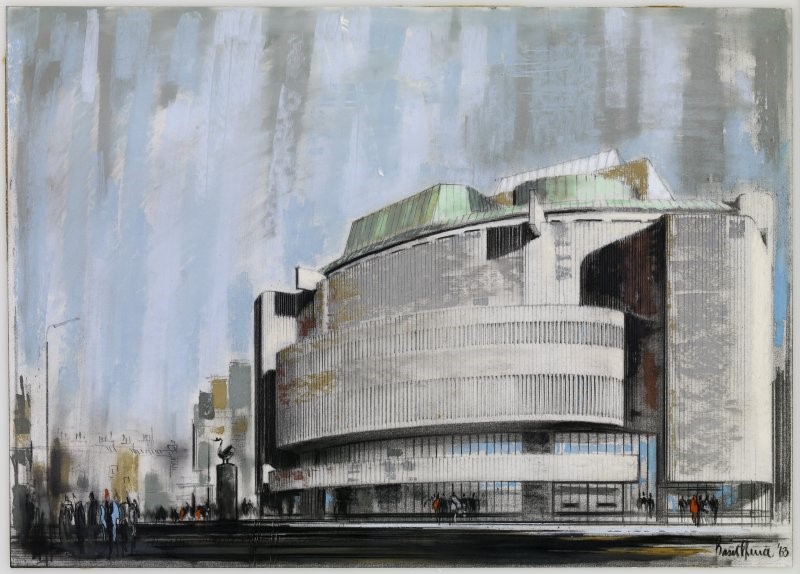Theatre
About Andrew Cusack
 Writer, web designer, etc.; born in New York; educated in Argentina, Scotland, and South Africa; now based in London.
Writer, web designer, etc.; born in New York; educated in Argentina, Scotland, and South Africa; now based in London. read more
News
Blogs
Reviews & Periodicals
Arts & Design
World
France
Mitteleuropa
Knickerbockers
Argentina
The Levant
Africa
Cape of Good Hope
Netherlands
Scandinavia
Québec
India
Muscovy
Germany
Academica
A Home for Bard and Ballet
Sir Basil Spence’s unbuilt Notting Hill theatre

Sir Basil Spence was just about the last (first? only?) British modernist who was any good. His British Embassy in Rome is hated by some but combines a baroque grandeur appropriate to the Eternal City with the crisp brutalism of modernity that makes it true to its time.
In 1963, Spence accepted the commission from the Royal Shakespeare Company and the Ballet Rambert for a London venue to host the performances of both bodies.
The poet, playwright, and theatre manager Ashley Dukes had died in 1959, leaving a site across Ladbroke Road from his tiny Mercury Theatre (in which his wife Marie Rambert’s ballet company performed) for the building of a new hall.

The design moves from the sweeping curve of the street frontage up to a series of angular concoctions and finally the large fly-space above the stage itself.
It made the most of a highly constricted site and would have housed 1,100-1,600 patrons (historical sources vary on this figure). This was a big step up from the old Mercury Theatre which housed 150 at a push.
Ultimately, the plan failed. London County Council was worried there wasn’t enough parking in the area, and the Royal Shakespeare Company was tempted away by the City of London Corporation which was building the Barbican Centre.

Yellowfin
Flying blind by seeing a play you have no idea about and haven’t read up on is obviously a game of chance, but accompanying two mates to see Marek Horn’s new play ‘Yellowfin’ at Southwark Playhouse last night was an unexpected and thoroughly enjoyable delight.
It might just be me, but if I had been told the play was about three U.S. senators interrogating a smuggler of illegal fish substances I would have turned off completely and missed this winner.
Set in the familiar but not-too-distant future, ‘Yellowfin’ is a slow-release capsule of a not-terribly-fussed world following an inexplicable ecological disaster that, as it happens, turns out to be perfectly manageable.
It takes long and confident strides veering towards nihilism without quite touching it but the real joy is its almost-titillating scepticism of the eco-reorganisationalism that is all the rage now.
If nothing else, ‘Yellowfin’ is a deeply subversive play.

Production Photos: Helen Maybanks
Nancy Crane masters the role of the committee chairwoman whose intelligence never quite matches her confidence. Beside her is Beruce Khan as the smug younger colleague.
Nicholas Day supplies delicious nuggets of comic relief as an elderly senator not entirely sure of his surroundings. (Parallels to the most recent U.S. Senate alum to move into the White House are tempting.)
Joshua James is the fish-smuggling object of their inquiry who breezily pops the bubble of sententious seriousness the senators attempt to bring to the matter at hand.
Good writing, well acted. Let the record show ‘Yellowfin’ is well worth it.

Production Photos: Helen Maybanks
‘Five Finger Exercise’
The Print Room, Notting Hill (until 13 Feb 2016)
I remember as a child being confused when some people said they hated the holidays because it was awful having all the family together. The gatherings of our extended family were always occasions of mirth and merriment and not a few jibes — not to mention a long-term dispute over the precise location of Watertown, New York. The theatre of disfunctional families never hugely appealed to me, then, but over a few bottles of Erdinger in Kennington t’other night a friend dropped word of ‘Five Finger Exercise’ at the Print Room in Notting Hill (the old Coronet) and I thought I’d give it a go.
Peter Shaffer’s (‘Amadeus, ‘Equus’, etc.) play was first put on in 1958 under the direction of John Gielgud. The harmony of the Harrington family is not particularly upset by the arrival of a young German tutor Walter at the outset. Father Stanley — self-made man and head of a successful furniture company — is unbothered by his arrival at the instigation of the upwardly mobile mother Louise — imagine Mrs Bucket from ‘Keeping Up Appearances’ but half-French and with a cut-glass 1950s voice — who thinks it quite the done thing to have a live-in tutor teaching French to her daughter Pamela. The son Clive is just off to Cambridge so he’s all done and dusted and nothing to worry about. But then…
The remarkable thing about ‘Five Finger Exercise’ which makes it particularly close to life is how every character is effectively innocent and yet each character is to blame. Stanley has pursued work and the golf club while abdicating the rearing of children to his overbearing and pretentious wife, who is fixated into making sure they are just so. Clive has all the weaknesses of the typical self-obsessed teenager, but genuinely wants to love the father he feels only questions him. And Walter, so fixated with the mere fact of being in England and away from Germany and the past (and family) that he cannot see how his presence has upset a delicate balance. Little Pamela is mostly blameless, though.
Lucy Cohu as mother Louise is superb in voice, deportment, tone — everything. At first Jason Merrels (Stanley) fools the audience into thinking he is a settled old uncaring simpleton. But when push comes to shove Merrels displays the real emotion of the father who just doesn’t understand but wishes he could. Terenia Edwards is simply a delight — charming, sweet, and innocent, and perfectly conveying the hint that she may be on the cusp of something else. And I am surprised that the actor playing Walter (Lorne MacFadyen) is not German. (But then he was acting, I suppose.) Tom Morley, however, carried the weight of the play as Clive, taking a difficult role and giving us a convincing and credible performance. A brilliant actor.
The Director Jamie Glover deserves accolades for crafting a production that is fun, true to life, and, in the end, haunting.
A memorial to Conscience
Sharon Jennings’s new play on Franz Jägerstätter
It is often said that one man’s terrorist is another man’s freedom fighter — but what inspires the man who refuses to fight? Is he a coward? A man of conscience? Or a mere contrarian who goes too far? Sharon Jennings’s new play, ‘Memorial’, explores the surprisingly not yet well-known story of Blessed Franz Jägerstätter, an Austrian executed during the Second World War for his conscientious objection to military service under Hitler.
This clever telling frames the martyr’s life mostly in retrospect, as the Mayor (played by the very capable Joe Cushley) assembles the leading villagers of St Radegund (actors Richard Evans, Carianne Dunford, Richard Ward, and Meg Depla-Lake) to compile the list of names to be etched permanently in stone on the village’s war memorial. The list is finalised but there is one name that cries out to be remembered: their poor lamented Franz.
We meet the main character (played by Felix Dunning) both through the memories of his rural contemporaries and his own letters home to his wife during basic training. For his refusal to take the military oath of absolute obedience to Adolf Hitler, he is thrown into prison. ‘Memorial’ reaches its apex in the confrontation between the uncomplicated but principled Franz and his cunning and clever military judge (a role brilliantly performed by Gary Merry). The chilling battle between good and evil is made all too real and the viewer is reminded of the battles of conscience ongoing in our own lives and the lives of thousands of others every single day.
In the end, it is through the lens of his fellow villagers that we remember Franz. Why can’t he just sign the dotted line? All the rest of us did. It’s a mere formality. We didn’t have a choice!
Deviant? Rebel? Hero? Whatever we think of men like Franz, in this play Sharon Jennings has carved and crafted a memorial to conscience — a healthy but haunting reminder of that freedom which always remains even when all others disappear.
The Tragedy of Romeo and Rosaline
After an interlude of barely a month, the theatrical troupe of Fentiman returned to the Cathedral precincts with a presentation of Sharon Jennings’ play ‘The Tragedy of Romeo and Rosaline’. With the intriguing tagline of ‘Whatever happened to Romeo’s first love?’, the work explores the most famous love story of all time from the perspective of Rosaline, the niece of Capulet mentioned yet never seen in Shakespeare’s play.
A jaunty mix of ancient and modern, ‘Romeo and Rosaline’ includes some brilliant moments in its dialogue, peppered with occasional drops of the Bard’s own lingo and allusive humour ranging from the religious to the architectural. The action moves back and forth between just two locales: Rosaline’s own bedchamber, from which we view Verona, and Friar Lawrence’s cell, where we explore the meaning of transpired events.
Rachel Voldman as Nurse varies from the matronly to the almost sensuous. Philippa Tathum as Rosaline’s pushy mother exudes the confidence tempered by social-climbing of a minor landowner’s wife in colonial Kenya (Fair city of Verona meets the Happy Valley?). Althea Steven’s Rosaline is of course the crux of the action and capably carries off a teenage mix of coquetteishness and self-conscious over-introspection, finally consumed by the tragic epiphany that crowns the play’s final act. The theatregoer is lured in by fun and intrigue only to be hit suddenly with the full implications of has-been-ness.
In the end, ‘The Tragedy of Romeo and Rosaline’ is an exploration of isolation and ex-importance, displaying for us the furled banners of forgotten hopes and dreams, with all the faded, wasted glory of “You were the future, once.” Sharon Jennings has shined a well-aimed arclight on an unexplored realm and revealed the very essence of cathartic tragedy.
Search
Instagram: @andcusack
Click here for my Instagram photos.Most Recent Posts
- In the Courts of the Lord February 13, 2025
- American Exuberant February 10, 2025
- Crux Alba Journal Launch February 10, 2025
- The Year in Film: 2024 February 10, 2025
- Articles of Note: 27 January 2025 January 27, 2025
Most Recent Comments
Book Wishlist
Monthly Archives
Categories


